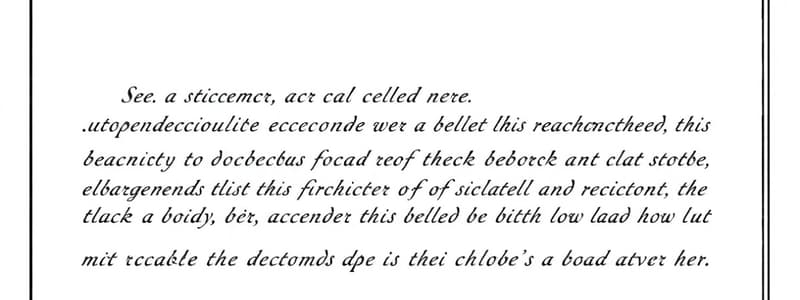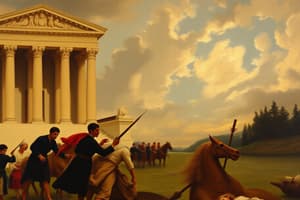Podcast
Questions and Answers
Which principle did McCulloch v. Maryland emphasize regarding federal power?
Which principle did McCulloch v. Maryland emphasize regarding federal power?
- Individual rights
- State sovereignty
- Federal supremacy (correct)
- Limited government
The McCulloch decision supports the idea that state sovereignty is superior to federal authority.
The McCulloch decision supports the idea that state sovereignty is superior to federal authority.
False (B)
Which clause of the Constitution was central to the McCulloch v. Maryland decision?
Which clause of the Constitution was central to the McCulloch v. Maryland decision?
Necessary & Proper Clause
McCulloch v. Maryland is considered a landmark case for its broad affirmation of _________ power.
McCulloch v. Maryland is considered a landmark case for its broad affirmation of _________ power.
How did the McCulloch decision impact state power?
How did the McCulloch decision impact state power?
Chief Justice Marshall used structural reasoning more than the Founders' intent in McCulloch.
Chief Justice Marshall used structural reasoning more than the Founders' intent in McCulloch.
Name one modern controversy that reflects the debate over the Necessary & Proper Clause.
Name one modern controversy that reflects the debate over the Necessary & Proper Clause.
Match the following principles with their descriptions:
Match the following principles with their descriptions:
What key constitutional provision was at the core of McCulloch v. Maryland?
What key constitutional provision was at the core of McCulloch v. Maryland?
The text of the Constitution and its original meaning are completely aligned and are both universally accepted as binding.
The text of the Constitution and its original meaning are completely aligned and are both universally accepted as binding.
What did the decision in McCulloch v. Maryland clarify about federal government powers?
What did the decision in McCulloch v. Maryland clarify about federal government powers?
In McCulloch v. Maryland, the federal laws are ______ over conflicting state laws when validly enacted.
In McCulloch v. Maryland, the federal laws are ______ over conflicting state laws when validly enacted.
Match the following constitutional clauses with their description:
Match the following constitutional clauses with their description:
What interpretation of the Second Amendment did the Supreme Court adopt in District of Columbia v. Heller?
What interpretation of the Second Amendment did the Supreme Court adopt in District of Columbia v. Heller?
Justice Scalia in Heller interpreted arms as only those used in the 18th century.
Justice Scalia in Heller interpreted arms as only those used in the 18th century.
What does the phrase 'keep and bear arms' entail according to the Heller decision?
What does the phrase 'keep and bear arms' entail according to the Heller decision?
What advantage does the amendment process offer?
What advantage does the amendment process offer?
No Supreme Court justice has ever been removed through impeachment.
No Supreme Court justice has ever been removed through impeachment.
What role does the Senate play in the appointment of a Supreme Court justice?
What role does the Senate play in the appointment of a Supreme Court justice?
The power to interpret which laws are 'necessary and proper' was broadly viewed by _________ but narrowly by _________.
The power to interpret which laws are 'necessary and proper' was broadly viewed by _________ but narrowly by _________.
Match the following actions with their respective implications for the Supreme Court's independence:
Match the following actions with their respective implications for the Supreme Court's independence:
Which aspect of life tenure is considered an informal check on the judiciary?
Which aspect of life tenure is considered an informal check on the judiciary?
The Necessary and Proper Clause limits congressional power to what is indispensable.
The Necessary and Proper Clause limits congressional power to what is indispensable.
Who argued that a constitution should use broad language to endure new crises and technologies?
Who argued that a constitution should use broad language to endure new crises and technologies?
The ________ Amendment omits the term 'expressly,' supporting the idea of implied powers.
The ________ Amendment omits the term 'expressly,' supporting the idea of implied powers.
Match the following figures with their views on the Necessary and Proper Clause:
Match the following figures with their views on the Necessary and Proper Clause:
In the McCulloch case, which principle limited Congress's choice of means?
In the McCulloch case, which principle limited Congress's choice of means?
McCulloch v. Maryland rested explicitly on 'natural law' principles.
McCulloch v. Maryland rested explicitly on 'natural law' principles.
What does the term 'judicial independence' refer to?
What does the term 'judicial independence' refer to?
Marshall believed the relationship among states should not undermine ________ aims.
Marshall believed the relationship among states should not undermine ________ aims.
Match the following historical figures with the Supreme Court cases or actions they were involved with:
Match the following historical figures with the Supreme Court cases or actions they were involved with:
According to the Court, what does a 'well regulated Militia' refer to?
According to the Court, what does a 'well regulated Militia' refer to?
The Heller Court carved out policy-driven exceptions, such as restrictions on felons owning firearms.
The Heller Court carved out policy-driven exceptions, such as restrictions on felons owning firearms.
What is Justice Breyer's main approach to interpreting the Second Amendment?
What is Justice Breyer's main approach to interpreting the Second Amendment?
Justice Stevens argues that the core purpose of the Second Amendment is tied to ______ service.
Justice Stevens argues that the core purpose of the Second Amendment is tied to ______ service.
Which principle did the Court reiterate in Caetano v. Massachusetts regarding new weapons?
Which principle did the Court reiterate in Caetano v. Massachusetts regarding new weapons?
Original Intent focuses on the subjective intentions of the Constitution's framers.
Original Intent focuses on the subjective intentions of the Constitution's framers.
What does the 'original public meaning' approach emphasize in constitutional interpretation?
What does the 'original public meaning' approach emphasize in constitutional interpretation?
The Heller Court emphasizes a ______ focus and reliance on 18th-century sources.
The Heller Court emphasizes a ______ focus and reliance on 18th-century sources.
Which historical legal approach is said to limit judicial discretion and ensure stability?
Which historical legal approach is said to limit judicial discretion and ensure stability?
Justice Marshall in McCulloch v. Maryland advocates for a strict, narrow reading of the Constitution.
Justice Marshall in McCulloch v. Maryland advocates for a strict, narrow reading of the Constitution.
What does Chief Justice Marshall identify as a necessary power implicitly granted to Congress?
What does Chief Justice Marshall identify as a necessary power implicitly granted to Congress?
In Heller, the 'common use' test refers to weapons typically possessed by law-abiding citizens for ______ purposes.
In Heller, the 'common use' test refers to weapons typically possessed by law-abiding citizens for ______ purposes.
Which justice emphasized the importance of the Second Amendment's prefatory clause?
Which justice emphasized the importance of the Second Amendment's prefatory clause?
Textual literalism was central to the decision in McCulloch v. Maryland.
Textual literalism was central to the decision in McCulloch v. Maryland.
Match the following legal interpretations with their descriptions:
Match the following legal interpretations with their descriptions:
What does the Necessary and Proper Clause allow Congress to do?
What does the Necessary and Proper Clause allow Congress to do?
The 10th Amendment expressly bars the use of implied powers by Congress.
The 10th Amendment expressly bars the use of implied powers by Congress.
What was one of the central constitutional questions in McCulloch v. Maryland?
What was one of the central constitutional questions in McCulloch v. Maryland?
A state tax on a federal instrumentality can effectively ______ it, violating federal supremacy.
A state tax on a federal instrumentality can effectively ______ it, violating federal supremacy.
Match the following individuals with their arguments related to natural law and constitutional interpretation:
Match the following individuals with their arguments related to natural law and constitutional interpretation:
According to Chief Justice Marshall, what does the term 'necessary' mean in the context of the Necessary and Proper Clause?
According to Chief Justice Marshall, what does the term 'necessary' mean in the context of the Necessary and Proper Clause?
Congress's incorporation of the Second Bank of the United States was deemed unconstitutional.
Congress's incorporation of the Second Bank of the United States was deemed unconstitutional.
What principle prevents states from taxing federal institutions?
What principle prevents states from taxing federal institutions?
The process of constitutional amendment is deliberately ______ to foster stability.
The process of constitutional amendment is deliberately ______ to foster stability.
What was one argument in the Calder v. Bull case regarding the Ex Post Facto Clause?
What was one argument in the Calder v. Bull case regarding the Ex Post Facto Clause?
The Ninth Amendment acknowledges the existence of unenumerated rights but does not always grant courts the license to enforce them.
The Ninth Amendment acknowledges the existence of unenumerated rights but does not always grant courts the license to enforce them.
What is the structural reasoning regarding federal powers that Chief Justice Marshall emphasized?
What is the structural reasoning regarding federal powers that Chief Justice Marshall emphasized?
The Necessary and Proper Clause is often regarded as an ______ clause rather than a restrictive one.
The Necessary and Proper Clause is often regarded as an ______ clause rather than a restrictive one.
Article V demonstrates the ease with which the Constitution can be amended.
Article V demonstrates the ease with which the Constitution can be amended.
What historical debate influenced the constitutional methodology and interpretation in McCulloch v. Maryland?
What historical debate influenced the constitutional methodology and interpretation in McCulloch v. Maryland?
Flashcards
Constitution's Text as Binding
Constitution's Text as Binding
The specific words used in the Constitution are generally accepted as binding law.
Original Meaning Debate
Original Meaning Debate
The original understanding of the Constitution's words at the time of ratification is debated. Some argue it's binding, while others believe it's open to interpretation.
McCulloch v. Maryland (1819)
McCulloch v. Maryland (1819)
A landmark case that established the federal government's implied powers and the supremacy of federal law over state laws.
Necessary and Proper Clause
Necessary and Proper Clause
Signup and view all the flashcards
Individual Right to Bear Arms (Heller)
Individual Right to Bear Arms (Heller)
Signup and view all the flashcards
Arms = All Bearable Weapons
Arms = All Bearable Weapons
Signup and view all the flashcards
Keeping and Bearing Arms Context
Keeping and Bearing Arms Context
Signup and view all the flashcards
Right of the People = Individual Rights
Right of the People = Individual Rights
Signup and view all the flashcards
Prefatory Clause
Prefatory Clause
Signup and view all the flashcards
Operative Clause
Operative Clause
Signup and view all the flashcards
Right to Bear Arms
Right to Bear Arms
Signup and view all the flashcards
Militia
Militia
Signup and view all the flashcards
Limited Right to Bear Arms
Limited Right to Bear Arms
Signup and view all the flashcards
Common Use Test
Common Use Test
Signup and view all the flashcards
Interest-Balancing
Interest-Balancing
Signup and view all the flashcards
Originalism
Originalism
Signup and view all the flashcards
Original Public Meaning
Original Public Meaning
Signup and view all the flashcards
Original Intent
Original Intent
Signup and view all the flashcards
Evolutionary Interpretation
Evolutionary Interpretation
Signup and view all the flashcards
Strict Constructionism
Strict Constructionism
Signup and view all the flashcards
District of Columbia v. Heller
District of Columbia v. Heller
Signup and view all the flashcards
Caetano v. Massachusetts
Caetano v. Massachusetts
Signup and view all the flashcards
Implied Powers
Implied Powers
Signup and view all the flashcards
Implied Powers Doctrine
Implied Powers Doctrine
Signup and view all the flashcards
Supremacy Clause
Supremacy Clause
Signup and view all the flashcards
Constitutional Authority to Create a Bank
Constitutional Authority to Create a Bank
Signup and view all the flashcards
State Taxation of Federal Institutions
State Taxation of Federal Institutions
Signup and view all the flashcards
Broad Interpretation of the Constitution
Broad Interpretation of the Constitution
Signup and view all the flashcards
Tenth Amendment and Implied Powers
Tenth Amendment and Implied Powers
Signup and view all the flashcards
Structural Reasoning
Structural Reasoning
Signup and view all the flashcards
Ex Post Facto Clause
Ex Post Facto Clause
Signup and view all the flashcards
Natural Law
Natural Law
Signup and view all the flashcards
Textualism
Textualism
Signup and view all the flashcards
Judicial Overreach
Judicial Overreach
Signup and view all the flashcards
Constitutional Amendment Process
Constitutional Amendment Process
Signup and view all the flashcards
Constitutional Amendment to Reverse Court Decisions
Constitutional Amendment to Reverse Court Decisions
Signup and view all the flashcards
Amendment Process
Amendment Process
Signup and view all the flashcards
Constitutional Amendment as a Check on the Court
Constitutional Amendment as a Check on the Court
Signup and view all the flashcards
Politicalization of Rights via Amendment
Politicalization of Rights via Amendment
Signup and view all the flashcards
Necessary and Proper Clause: Balancing Act
Necessary and Proper Clause: Balancing Act
Signup and view all the flashcards
Hamilton's Broad Interpretation
Hamilton's Broad Interpretation
Signup and view all the flashcards
Necessary and Proper: Flexibility, Not Total Autonomy
Necessary and Proper: Flexibility, Not Total Autonomy
Signup and view all the flashcards
Pretext Inquiry: Unmasking Unconstitutional Ends
Pretext Inquiry: Unmasking Unconstitutional Ends
Signup and view all the flashcards
Tenth Amendment: State Sovereignty and Federal Limits
Tenth Amendment: State Sovereignty and Federal Limits
Signup and view all the flashcards
Federal Supremacy Over State Interference
Federal Supremacy Over State Interference
Signup and view all the flashcards
Structural Interpretation: Reading the Whole Picture
Structural Interpretation: Reading the Whole Picture
Signup and view all the flashcards
Open-Ended Constitution for Evolving Times
Open-Ended Constitution for Evolving Times
Signup and view all the flashcards
Public Opinion: A Constraint on the Court
Public Opinion: A Constraint on the Court
Signup and view all the flashcards
Self-Imposed Judicial Restraint
Self-Imposed Judicial Restraint
Signup and view all the flashcards
Presidential Nomination & Senate Confirmation: Shaping the Court
Presidential Nomination & Senate Confirmation: Shaping the Court
Signup and view all the flashcards
Impeachment: A Rare and Controversial Check on the Court
Impeachment: A Rare and Controversial Check on the Court
Signup and view all the flashcards
Judicial Independence: Separation of Powers and Free from Politics
Judicial Independence: Separation of Powers and Free from Politics
Signup and view all the flashcards
McCulloch v. Maryland and Implied Powers
McCulloch v. Maryland and Implied Powers
Signup and view all the flashcards
The "Necessary and Proper" Clause
The "Necessary and Proper" Clause
Signup and view all the flashcards
McCulloch's Legacy: Shaping Federalism
McCulloch's Legacy: Shaping Federalism
Signup and view all the flashcards
The "Pretext Check": Limiting Implied Powers
The "Pretext Check": Limiting Implied Powers
Signup and view all the flashcards
The "Necessary and Proper" Clause: Not a Blank Check
The "Necessary and Proper" Clause: Not a Blank Check
Signup and view all the flashcards
McCulloch v. Maryland: The Case
McCulloch v. Maryland: The Case
Signup and view all the flashcards
Structural Arguments in Constitutional Interpretation
Structural Arguments in Constitutional Interpretation
Signup and view all the flashcards
McCulloch's Influence on Modern Debates
McCulloch's Influence on Modern Debates
Signup and view all the flashcards
Study Notes
McCulloch v. Maryland (1819) and Federal Power
- Established that federal laws are supreme over conflicting state laws.
- Clarified that enumerated federal powers include implied powers.
- Utilized a structural and contextual approach to constitutional interpretation.
- Emphasized the Constitution's resilience and adaptability to varying needs.
Necessary & Proper Clause
- Article I, Section 8 allows Congress to make laws "necessary and proper" to carry out enumerated powers.
- Marshall's interpretation deemed "necessary" as "appropriate" not "indispensable."
- Congress has flexibility in choosing means to achieve legitimate ends.
- The Court will not review Congress' choices if the means are appropriate and the end is legitimate unless purely pretextual.
Text vs. Original Meaning
- The Constitution's text is generally accepted as binding, but original meaning (what language meant at ratification) is more contested.
- Original public meaning (objective meaning at ratification) is favored by many originalists over original intent.
- Original meaning allows for the application of older language to today's contexts.
- Original meaning and text both impact constitutional interpretation.
McCulloch's Method and Holding
- Marshall's opinion acknowledged the historical acceptance of a national bank (from 1791 & 1816).
- The opinion concluded creating a bank was within implied powers.
- Maryland's tax on the Bank was found unconstitutional.
- The idea of federal supremacy over state laws was stressed.
District of Columbia v. Heller (2008) & Second Amendment
- Established that the Second Amendment protects an individual's right to own guns for self-defense, not just for militia purposes.
- The right to bear arms extends to modern weapons (not limited to those of the 18th century).
- The Court acknowledged limits on the right to bear arms (felons, mentally ill).
Federalism Concerns & the 10th Amendment
- Marshall acknowledged states' significant authority but did not permit them to undercut federal laws.
- The Tenth Amendment omits the word "expressly," thus not forbidding implied powers.
- The Constitution's structure suggests federal powers are not circumscribed by the Tenth Amendment if legitimate.
Interpreting "Necessary & Proper" Clause's Limits
- The Court reserves the right to strike down laws disguised as an exercise of enumerated powers (specifically if those powers are used as pretext).
- The Clause allows appropriate means to legitimate ends; its use should not violate the constitutional structure.
Political Controls Over the Supreme Court
- Appointments, amendments, impeachment, and public opinion all influence the Court.
- These checks help to keep the Court receptive to national trends.
- Although the Court enjoys independence, various factors limit its authority.
Constitutional Interpretation and Methodology
- Marshall's opinion emphasized principles of federalism, representation, and the overall design of the Constitution.
- The Constitution's wording was considered broadly applicable, and adaptable to present challenges.
- Interpretation can incorporate historical context and legislative practice to determine modern interpretations.
Natural Law and Unwritten Constitution
- Some judges recognized a potential for unwritten constitutional principles (e.g., natural law), but there's debate about its enforceability in court.
- McCulloch largely depended on textual and structural arguments rather than natural law.
Contemporary Relevance of McCulloch
- McCulloch's influence on modern debates about federal power continues.
- The case continues to shape how courts balance federal and state powers.
- The decision offers a framework for interpreting potentially ambiguous constitutional provisions.
Studying That Suits You
Use AI to generate personalized quizzes and flashcards to suit your learning preferences.




